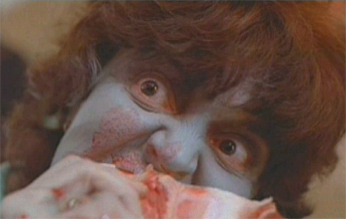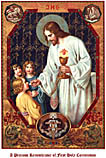CHRISTIAN CANNIBALS
An argument of why Christians are cannibals (and possibly vampires) from Christianity's own perspective
by Jim Walker (an ex-cannibal)
Originated: 07 January 2003
How many Christians realize that when they eat that wafer and drink the wine during communion service that they, in effect, practice cannibalism by the partaking in the eating of human flesh and blood?
I certainly did not know that when I underwent communion in my religious days. It sounds so innocent and benign; "Communion" imparts the concept of sharing thoughts and feelings, or so I thought. Oh how the priests fooled me. They used other obscure terms too, like "Eucharist" and "Sacrament of the Last Supper." At no time did a priest or deacon explain to me that I would share in the communal eating of the human flesh and blood of Jesus.
Cannibal: A person who eats the flesh of human beings.
Since Jesus represents an actual human being, and I ate him, that made me a cannibal. And if you have ever undergone communion, then you too fall into that category.
The Church tricked me and turned me into a cannibal!
Not only did I drink blood and eat flesh, but they made me do it in front of a statue of a bloody corpse hanging by nails on two pieces of lumber, a representation of the human whom I had just eaten. (Imagine eating a hamburger in front of an image of a freshly slain cow.)
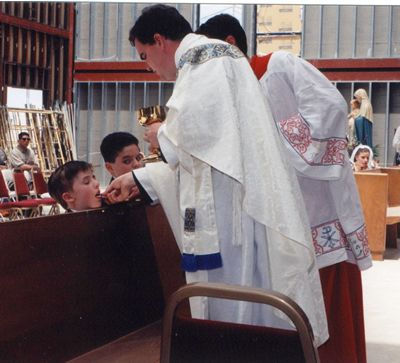 | The Church indoctrinates cannibalism at an early age. Here we have a priest putting pieces of raw human flesh into the mouths of children. |
 | While Popes and priests visit foreign countries, they also make sure to spread their cannibalism. Did this priest tell this child that she would eat human meat before putting a slice of it into her mouth? |
When I discovered the shocking realization that I had eaten human flesh, and drank human blood I felt like vomiting. Where in the world did this morbid practice begin, I wondered. I reread the Bible for clues. Could that explain the mystery of the empty tomb of Jesus (Luke 24:3)? Did the disciples eat him?
Several Christians tried to console me by explaining that Communion only represents the symbolic eating of flesh, not the real thing (I later discovered that many Protestant Christians don't believe in the literal eating of Jesus, although some do). I felt relieved for awhile until other Christians told me otherwise (virtually all Catholics and Episcopalians believe in the literal interpretation). I began to do a bit of research for myself from the Catholic Church's own position. My stomach began to churn again as I discovered what communion and the Eucharist really means.
Communion
Communion, or "Holy Communion" as the Church officially calls it, means the actual reception of the Sacrament of the Eucharist. As the Catholic Encyclopedia puts it, "For real reception of the Blessed Eucharist it is required that the sacred species be received into the stomach. For this alone is the eating referred to by our Lord (John 6:58)."
So you can't just put it in your mouth and spit it out. Oh no. You have to make sure you swallow it into your stomach!
I looked up the Biblical chapter in John 6 and found this diabolical revelation:
Then Jesus said unto them, Verily, verily, I say unto you, Except ye eat the flesh of the Son of man, and drink his blood, ye have no life in you. Whoso eateth my flesh, and drinketh my blood, hath eternal life; and I will raise him up at the last day. For my flesh is meat indeed, and my blood is drink indeed. (John 6:53-55)
Egads, I thought, Jesus really wants them to EAT HIM! It would make perfect sense if the disciples did eat his dead corpse. Of course you wouldn't want to admit your cannibalism to the unbelievers and you'd have to explain the missing body to the authorities. You might say something like, "He is not here, but is risen..." (Luke 24:6). Yeah, right, that's the ticket.
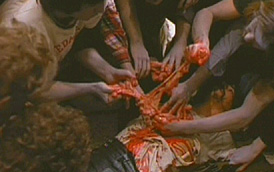 | If the disciples did eat Christ, it may have looked something like this. |
Eucharist
Eucharist describes the name given to the "Blessed Sacrament of the Altar," (older religions also used blood sacrifices to an altar. Some used virgin humans, bulls, lambs, etc.). The Christians use it to mean an actual sacrifice by Jesus where they truly believe the bread and wine turns into the actual corporal flesh and blood of Jesus Christ. Christians also use other titles such as, "Table of the Lord" (Mensa Domini) or the morbid term, "Lord's Body" (Corpus Domini).
From the Catholic Church and as far back as the pronouncement from the Council of Trent, the quintessence of the Eucharist means that "the Body and Blood of the God-man ARE truly, really, and substantially present."
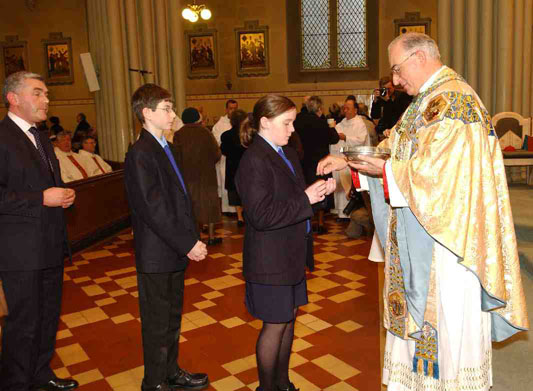 |
| Here we have a community of Christians lining up to eat and swallow the uncooked flesh of Jesus in what Christianity calls the "Blessed sacrament of the Altar" or better known as the 'Eucharist' during a ceremony of communion. Looks innocent, doesn't it? Not at all the image of cannibalism as usually depicted in folklore. |
So how does bread and wine turn into actual flesh, you may ask? The Christians believe it comes from the concept of transubstantiation.
Transubstantiation
According to the Catholic Encyclopedia, Hildebert of Tours (~1079) probably first used the term transubstantiation and later adopted by the Fourth Council of the Lateran (1215) and the Council of Lyons (1274), and finally, the Council of Trent (1545-1563).
Transubstantiation basically means, the transition or conversion of one thing into another in some aspect of being. Turning water into wine gives one example of transubstantiation, and turning bread into flesh and wine into blood gives another. Transubstantiation, however, doesn't just describe a simple conversion of one thing into another but a substantial conversion (conversio substantialis). Transubstantiation differs from every other substantial conversion in this, that only the substance gets converted into another.
In the Eucharist, two extremes of conversions occur, namely the bread and wine as the terminus a quo, and the Body and Blood of Christ as the terminus ad quem (before and after). In other words, the substance of the bread and wine departs in order to make room for the Body and Blood of Christ.
Transubstantiation, as a conversion of the total substance, is the transition of the entire substance of the bread and wine into the Body and Blood of Christ, comes as the express doctrine of the Church (Council of Trent, Sess. XIII, can. ii).
No true Christian should doubt it. Eating that wafer and wine in Church actually means truly and really eating human meat and blood. In fact, it's the entire body: eyes, brains, gall bladder, spleen, rectum, penis, testicles, etc. Everything. If you've ever watched the TV program, Fear Factor, that's nothing compared with eating the components of an entire human body. According to the Council of Trent, if you deny this, then you are accursed (anathema). I guess that means you go to hell too.
For the full reading of this official Church doctrine from the Council of Trent, click here.
How does transubstantiation work?
So how does transubstantiation actually work; what process does the Church use to transform bread and wine into human flesh and blood (and guts, etc.)? Apparently this remains a deep Church secret. However, we do know that the priests make verbal incantations, pass smoking incense about, and pray a lot during a rite they call "Offertory" (Offertorium). Apparently the actual transformation occurs during the Prayer of Consecration, by which the bread and wine cease to be bread and wine, and are converted into the flesh and blood of Christ. At just what miraculous moment during the prayer it turns into human flesh, I haven't clue and I suspect the priests don't either. Apparently Jesus does the actual conversion, but I haven't discovered the method of how the priests know when this occurs or what test procedures they use to insure that Jesus made the transubstantiation (what if Jesus got lazy that day or just decided, enough is enough?).
In any case, by the time the priest places the wafer into your mouth, you can rest assured that you are actually eating Christ's meat. (It tastes like chicken.)
We do know that an industry exists to make the bread and wine. For example, S&M (I kid you not) stands as one of the companies that make official communion bread for the Church:
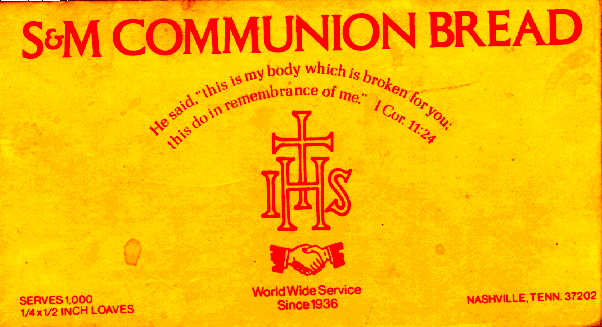
If you don't know what S&M means, in colloquial terms it stands for sadomasochism or the practice of sadism (sadistic) and masochism (subjecting oneself to abuse or physical pain).
Now I doubt that this company's name means or intends a connection with sadomasochism, but it seems an appropriate term if you consider what the eating of human flesh means to the recipient or the giver of one's own flesh. I cannot think of another word than sadomasochism to better describe the act of consciously eating the flesh of a human from another person (a sadistic act) who willingly gives them their flesh and blood to eat (an extreme masochist act).
Frankwright Mundy & Co. Ltd. sells communical sets. They even offer briefcases and shoulder bags for carrying around the flesh and blood of Jesus. What next, I wondered; will they one day build fast food outlets where a Christian can get Jesus meat anytime of day? McJesus? Christ-In-A-Box? Considering the Bush administration's disregard for the Constitution, these chain restaurants could avoid taxes and get special federal funding as Faith-based institutions. We could all become cannibals!
Vampirism
Not only did I eat human flesh in my communion sacraments, but I also drank the "actual" blood of Jesus. Doesn't this make me a vampire also? Although vampires supposedly suck blood instead of drinking it, this seems an insignificant distinction. On the contrary, the drinking and the whole swallowing of blood as opposed to sucking seems to me a bit more bloodthirsty if you ask me.
If you consider the folklore surrounding vampire stories and compare them with the beliefs of Christianity, the claims appear similar. Vampire myths (see Dracula) and Christianity both believe that by drinking human blood, you will live forever. Actually Christianity goes one step further by requiring the eating of human flesh along with the blood (John 6:53-55). And of course you're also eating the penis of Jesus (does that make one gay, I wonder?) and the small and large intestines of Jesus, and the bladder of Jesus, etc. Only by this cannibalistic act can you achieve "eternal life."
Consider also that vampirism and their drinking of blood and immortality represent fiction, whereas Christians actually believe their communal drinking of blood and eating of Jesus' corpse will earn them eternal life. Doesn't this, at the very least, put Christian vampirism in a more deleterious light than fictional vampirism?
Note that the actual Dracula (not the fictional one) lived as a Christian. Click here for more information. No doubt the real Dracula thoroughly enjoyed his communal ingesting of human blood.
Addiction?
Now I don't know why just one eating of flesh and drinking of blood won't get you to heaven, but I've yet to get a good explanation of why Christians need to eat flesh and blood every week. This continual practice of ritual cannibalism and vampirism brings up even more pressing questions about this gruesome practice. Does the act of communion lead to habitual use or an addictive need for more flesh and blood? Consider that Christians have done more to promote bloody wars throughout history than any other group, and their insistence on evangelizing every human on earth to their faith, should non-believers fear that the Christians might turn them into human flesh eaters too?
| They start this addiction at the earliest possible age. For the first communion, they actually give a reward for remembering their first cannibalistic act, usually in the form of a certificate. (You'd think the promise of everlasting life would serve as enough reward.) Note that nowhere in the certificate does it say that you've just eaten the human meat of Jesus. |
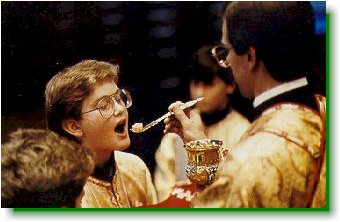 | Here we have a Christian boy eagerly awaiting his fix of Jesus' flesh. (Note the extra large portion.) |
 |
|
Another concern involves the length of time of transubstantiated bread and wine. Just how long does this conversion last? We now know that you must swallow it for its effect to work, but at what stage does it turn back into naturally digested bread and wine? Does it remain transubstantiated even after digestion? Does it ever reconvert? If not, consider what this means as we move our bowels. Should we not treat the remains of Christ as sacred, just as we do the remains of the bodies of dead saints? Perhaps we might consider a better form of elimination of the excrement made from our Redeemer than just thoughtlessly flushing Him down the toilet.
I find the practice of sacred cannibalism disturbing and potentially life threatening, regardless of how many of the addicted faithful tell us it will give us everlasting life. I humbly make the following proposal: that the FDA and the CDC get involved in the study of the composition of the Transubstantiated bread and wine and the narcotic or addictive effects they may impose on the human body.
I hope that I have alarmed you enough to contact your local law enforcement office and state representative about this pressing matter. If you and I don't do it, who will?
Conclusion
Even if you still stubbornly cling to the belief that the Eucharist represents only a symbol of eating flesh and drinking blood, that still makes you a cannibal, if only a symbolic cannibal. If you partake in communion as a metaphorical representation of eating Christ's body, then that still makes you a metaphorical cannibal. You simply have no easy out of this predicament as a symbolic cannibal sits as a subset of cannibalism.
- You might also want to question the metaphorical or symbolic stance because if the Eucharist presents metaphor, then what does that say for Jesus himself and what Jesus directly says from the Bible about eating his meat? Metaphorical also? How do you distinguish between metaphor and reality in the Bible when it treats all doctrines equally as the inspired words of God? Would you object to the title of Symbolic Christian or Metaphorical Christian? If you consider yourself a metaphorical or symbolic Christian, then you still fall under the label of Christian just as a symbolic cannibal falls under the label of cannibal.
- There simply exists no way out for a Christian to escape the cannibal label, except of course to exit Christianity entirely. I did just that and by doing so, I escaped cannibalism along with all the other nonsense. I wrote this article as satire but if you live as one of the millions of faithful that believe in the Bible and the doctrines of Christianity then you must take this article as a serious argument.
Sources:
The Real Presence of Christ in the Eucharist
Offertory rite
The Council of Trent The Thirteenth Session
 |
